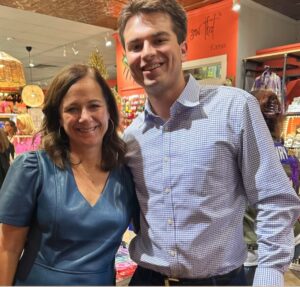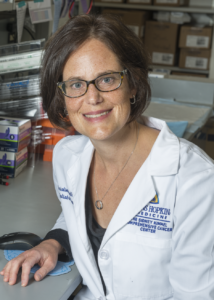Johns Hopkins UniversityEst. 1876
America’s First Research University
After her eldest son Brian’s cancer diagnosis at age 14, the Ronayne family entered a world of seemingly endless appointments. Brian, diagnosed with sarcoma, a rare cancer of the bones and soft tissue, received successful treatment at the Sidney Kimmel Comprehensive Cancer Center at Johns Hopkins and was eventually cleared of disease. But the emotional toll of ongoing scans remained, with appointments every three months, then every six.

“It’s incredibly intense,” Erin recalls. “As soon as you get through one scan, you’re scheduling the next.”
Making it to the five-year mark was a major milestone for the Ronayne family. Brian’s scans dropped to once a year, and the family began to dig into funding sources for pediatric cancer research connected with the physician-scientists who treated him at the Kimmel Cancer Center.
They were shocked to learn that only about 4% of the National Institutes of Health (NIH) budget supports research into pediatric cancers, like sarcomas.
“For the many researchers who are studying pediatric cancers in our laboratories, we only have access to a very small amount of federal funding,” explains Christine Pratilas, Brian’s pediatric oncologist and a researcher with a focus on sarcoma and connective tissue cancers. “Most pediatric cancer researchers are very reliant on foundation grants and philanthropy in order to do the research we do.”
Motivated to make a difference, Erin joined the Kimmel Cancer Center’s Pediatric Oncology Advisory Council, which works to fill these funding gaps. She also founded the Kids Helping Kids program, a grassroots initiative dedicated to raising funds and awareness for pediatric cancer research.
Now in its second year, Kids Helping Kids has partnered with student volunteers and Maryland-based Mix Match & Stack Jewelry to host pop-up bracelet shops and fundraisers, raising $36,000 to fuel research into pediatric sarcoma at the Division of Pediatric Oncology in the Kimmel Cancer Center. Mix Match & Stack Jewelry has been instrumental in the success of the program. With the help of 500 volunteers, more than 2,000 bracelets and bracelet-making kits have been created, along with notes of encouragement for patients currently undergoing cancer treatment.
Erin knows firsthand how important those services are for patients and their families.

“Patients frequently experience long periods of downtime during treatment, whether while waiting for doctor appointments or between procedures,” she explains. “The bracelets and kits offer them something fun to focus on, helping to distract from the treatment process. The response to the handmade bracelets and kits has been truly heartwarming.”
While Kids Helping Kids most often works with high school students, like those at Maryvale Preparatory School, its reach has expanded to corporate partners and local nonprofits. One unique collaboration is with Helping Up Mission, a Baltimore-based organization supporting people in recovery from addiction. Residents there volunteer their time to make bracelets.
“The response was extraordinary,” Erin says. “It’s inspiring to see individuals in recovery giving back to others while navigating their own challenging treatments.”
For researchers like Dr. Pratilas, the unrestricted funds from Kids Helping Kids are crucial for filling in financial gaps in pediatric cancer research. Philanthropy enables studies that generate preliminary data to apply for larger grants, pays for graduate student salaries, and funds smaller projects. One medical student-led project analyzed Kimmel’s experience with 10 patients diagnosed with a rare cancer type. The research has already caught the attention of pediatric and sarcoma specialists across the country.
“Getting our analysis and experience with rare sarcoma patients out in the literature can really make a difference for another patient,” Pratilas says. “It’s something that we believe in, and the philanthropic dollars can make those things feasible where they may otherwise not have been.”
For Erin, Kids Helping Kids has also been a way to bring healing to her family.
“It’s a family effort,” she says. “We are extremely grateful to everyone who has supported research in the past, enabling Brian to receive exceptional treatment. Now, we’re committed to paying it forward by raising funds and bringing kindness and hope to the families who will face the challenges of this difficult cancer journey in the future.”
Topics: Friends of Johns Hopkins Medicine, Kimmel Cancer Center, Fuel Discovery, Promote and Protect Health, Strengthening Partnerships